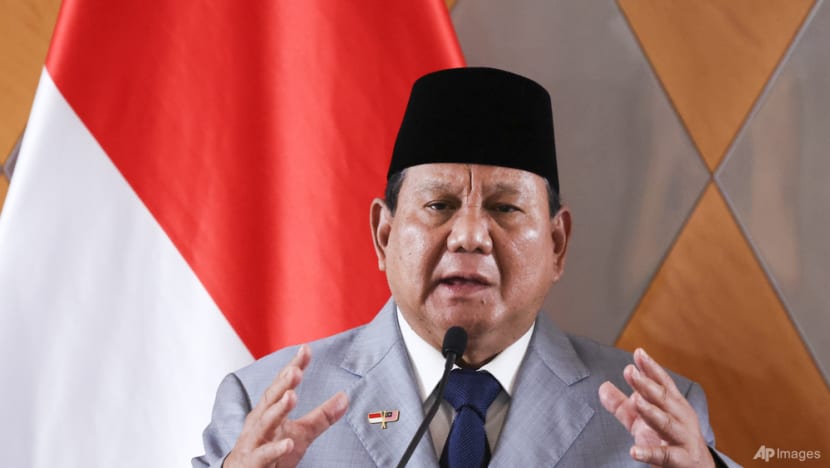‘It’s embarrassing’: Indonesia’s civil servants bemoan lack of toilet paper, drinking water as Prabowo’s budget cuts bite
Indonesian civil servants question President Prabowo Subianto’s budget efficiency drive while analysts caution against a “blanket approach”.

Some Indonesian government ministries' budgets have been cut by more than half. (Photo: iStock/Lutfi Hanafi)

This audio is generated by an AI tool.
JAKARTA: Earlier this month, Indonesian civil servant Kardiani (not her real name) found the supply of drinking water and toilet paper at her office restricted.
Most lights in the restrooms are now switched off, and use of the printer is tightly regulated.
“Now at 4pm, the air conditioning must be turned off, and only one elevator remains operational. Sometimes, we even have to use the freight elevator,” she said. Depending on their workload, she and her colleagues may end work only at 6pm or 7pm.
"We even have to pitch in to buy drinking water," Kardiani told CNA, requesting anonymity as she is not authorised to speak to the media.
Kardiani, 30, works at the Ministry of Women's Empowerment and Child Protection, one of many ministries affected by President Prabowo Subianto’s budget efficiency directive issued on Jan 23.
The president ordered a 256 trillion rupiah (US$15.76 billion) budget cut for ministries and state agencies, along with a 50 trillion rupiah reduction in central government transfers to regional administrations.
The cuts aim to save a total of 306.6 trillion rupiah in state funds in the first of three phases, he said. The first phase of cuts amounts to about 8.5 per cent of Indonesia’s 2025 budget proposed in August last year.
In the second phase, the government is gunning for another 308 trillion rupiah in savings, of which 58 trillion rupiah will be re-allocated among ministries and agencies.
And by this year, the government plans to utilise 200 trillion rupiah of the 300 trillion rupiah in dividends that state-owned enterprises are expected to generate, Prabowo said.
“In total, we will have 750 trillion rupiah,” Prabowo reportedly said last Saturday (Feb 15) at the 17th anniversary celebration of his Great Indonesia Movement (Gerindra) party.
His directive in January did not state the rationale for the budget cuts. But news outlets reported that the savings would be channelled to his administration’s flagship free nutritious meals initiative as well as Danantara, Indonesia’s new sovereign wealth fund to be launched on Feb 24.
"Our people, our children, must not go hungry," said Prabowo at the Gerindra event, as reported by news site Kompas.
In line with his directive, the Ministry of Finance helmed by Sri Mulyani Indrawati has implemented spending cuts across 16 budget categories. These include reductions in official travel, consultancy services, ceremonial events, meetings, seminars and office supplies.
According to news reports, the cuts affect most of Indonesia’s 48 ministries as well as other government agencies.
Only 16 entities including the People’s Consultative Assembly, the House of Representatives, the Coordinating Ministry for Political and Security Affairs, the Ministry of Defence, the National Police and the newly established National Nutrition Agency, which oversees the free meals programme, are not impacted.

MOTIVATION HAS “PLUMMETED”
The affected government bodies have seen their budgets slashed to different extents.
The Ministry of Women’s Empowerment and Child Protection’s budget has been cut by nearly 50 per cent for 2025, from 300.6 billion rupiah to 153.7 billion rupiah, according to its minister Arifah Fauzi, reported news outlet Kompas.
The Ministry of Primary and Secondary Education’s 2025 budget was trimmed by about 25 per cent, from 35 trillion rupiah to 26.27 trillion rupiah.
The Ministry of Communication and Digital Affairs’ budget shrank 58 per cent from 7.7 trillion rupiah to 3.2 trillion rupiah, an employee told CNA.
Civil servants said the belt-tightening measures have dented staff morale and could hurt the public.
Joanna (not her real name), a 35-year-old employee at the Ministry of Communication and Digital Affairs, said many of her ministry’s priority programmes, including telecommunications infrastructure in remote areas, national data centres and digital development projects, would be severely impacted.
“Imagine if those programs get defunded. The impact extends beyond civil servants — it affects the public who rely on these services,” she said.
Joanna also pointed to the inconsistency of the budget cuts and said they should be based on thorough research.
“If this so-called ‘efficiency’ backfires, it will ultimately be civil servants who pay the price,” she lamented.
“There’s no clear direction. Living costs are rising, but our earnings are stagnant. It’s frustrating.”

At the Ministry of Women’s Empowerment and Child Protection, minister Arifah said essential expenditure would be prioritised with the smaller budget.
This includes employee salaries from March to December this year, performance allowances for both the ministry and the Indonesian Child Protection Commission from February to December 2025, salaries for the Deputy Minister and two special ministerial staff, as well as operational costs for both institutions until the end of the year, according to Kompas.
The Indonesian Child Protection Commission operates under the ministry, which also provides the commission’s secretariat with technical and administrative support.
The ministry’s new budget is only able to fund the salaries of 34 call centre operators at SAPA 129, the ministry's hotline for reporting violence against women and children, she said.
“Support services such as victim assistance, outreach, and rehabilitation remain unfunded,” Arifah told Kompas.
As for office operations, CNA obtained an internal circular issued by her ministry’s secretary that states air conditioning is only allowed from 7am to 4.30pm at a maximum temperature of 23°C. Lighting should be supplemented by natural daylight, and elevators would only operate from 6am to 5pm.
“It’s embarrassing, especially when we have visitors,” said Kardiani. “This ministry represents the government, yet we can’t even provide basic necessities.”
The measures have eroded workplace morale, added Kardiani, who has worked at the ministry for over five years.
“Our motivation has plummeted. We just want to do the bare minimum. What really crushes our spirit is the disparity in efficiency measures between higher-ranking officials and (other) staff,” she said.

ONLINE BACKLASH LEADS SOME TO RETHINK MEASURES
The sweeping budget cuts have become a hot topic on Indonesian social media, with netizens contrasting the situations at different government ministries.
"The Ministry of Defence faces no budget efficiency measures and can even appoint Deddy Corbuzier as a special staffer, while the Ministry of Public Works is hit with an 81 trillion rupiah budget cut that could leave 18,000 people unemployed," states a post that has gone viral.
It was referring to two developments last week: The government’s appointment of five new special staff members, including podcaster and magician Deddy Corbuzier, at the Ministry of Defence last Tuesday (Feb 11), and talk that the Ministry of Public Works would lay off 18,000 contract employees due to the lack of budget allocation.
Minister of Public Works Dody Hanggodo clarified that the employees were not being dismissed; instead, their contracts would not be renewed due to budget efficiency measures.
His ministry’s 2025 budget has been slashed by more than half to 50.48 trillion rupiah, but the reduction of 60.46 trillion rupiah was less than the 81 trillion rupiah initially proposed.
On Feb 12, the Ministry of Public Works also announced it would cancel road maintenance programmes covering 47,000 kilometres due to the budget cuts.
Meanwhile at the Ministry of Defence, a special staff member is entitled to a salary ranging from 3.88 million rupiah to 6.37 million rupiah per month, plus a performance allowance of 20.69 million rupiah per month, according to news reports.
Defence Ministry spokesman Brigadier General Frega Wenas told CNN Indonesia that Deddy’s appointment was due to his significant social media influence.
But the government’s recruitment of a showbiz personality at a time when ministries are being forced to cut costs has sparked controversy.
Public policy expert Agus Pambagio warned that Deddy’s appointment could damage President Prabowo’s image. “Celebrities should stay in the entertainment industry, not in the government,” he told CNA.
Political analyst Agung Baskoro suggested that such appointments are acceptable if they do not strain the budget. “If possible, (appointees) should forgo their salaries since they’re already financially secure,” he said.
Last Friday (Feb 14), Deddy announced on social media that he would not accept any salary or material benefits from his Ministry of Defence appointment.
Some public service providers have backtracked on their budget efficiency plans after public backlash.
Indonesia’s National Library, for instance, announced plans on Feb 7 to shorten its operating hours and close on Sundays, joint leave days, and national holidays. But it retracted the decision within 24 hours after an outcry.
Last week, Indonesia’s state television network TVRI and state radio network RRI cancelled plans to lay off employees.
Their decision came after several contract workers took to social media to express their worry about losing their jobs, and meetings were held between the media networks and the House of Representatives.
ANALYSTS ARGUE AGAINST “BLANKET APPROACH”
Some analysts agree government expenditure needs to be trimmed, but say budget cuts should be targeted and avoid any impact on public services.
Political analyst Agung from the consultancy Trias Politika said budget savings are necessary given the government’s extensive expenditure, which includes maturing debts and the transition from former president Joko Widodo’s administration to President Prabowo’s government.
According to news outlet Tempo, government debt reached 8,680.13 trillion rupiah as of November 2024. Meanwhile, the Ministry of Finance reported that total debt maturing between 2024 and 2029 amounted to 4,182.5 trillion rupiah.
News outlet Bisnis also reported that the government must repay 100 trillion rupiah in state securities purchased by Bank Indonesia as part of burden-sharing efforts during the COVID-19 pandemic.
However, Agung stressed that budget cuts should be nuanced. "I agree with cutting ceremonial expenses and overseas comparative studies. But reducing public services and civil servants’ remuneration? That, I cannot support," he said.
Tauhid Ahmad, an economist from the Institute for Development of Economics and Finance (INDEF), argued that budget efficiency measures should not be applied uniformly across all sectors.
"A blanket approach will undoubtedly have negative consequences. The key is reallocating funds to create a budget structure that better serves public interests," he said.

WILL BUDGET CUTS HIT ECONOMIC GROWTH?
Economist Bhima Yudhistira from the think tank Center Of Economic and Law Studies·(CELIOS) said without careful planning, the policy could slow economic growth.
CELIOS predicts that Indonesia’s economy will grow 4.7 per cent in 2025 due to these budget efficiency measures, below the 5.2 per cent targeted by the government.
"This budget efficiency approach differs from that of president Jokowi’s administration, where an automatic adjustment mechanism allowed ministries to propose recommendations for priority funding. Now, all ministries face budget cuts without a flexible mechanism," Bhima explained.
However, Tauhid from INDEF believes that the overall macroeconomic impact of these efficiency measures will be relatively small.
"There will be short-term disruptions, but the economy will adjust. Sectors experiencing budget reductions will be offset by others receiving additional funding," he told CNA.
Regarding staff numbers, Agung from Trias Politika called for a proper evaluation to determine whether the number of contract employees aligns with actual needs.
"If layoffs are inevitable, there should be compensation packages, such as one or two months’ salary, to help them transition to new jobs. We cannot simply terminate their employment without providing solutions," he said.
Contract workers play a crucial role in delivering public services, said Bhima. "If too many contract workers are let go, public services could collapse, which would ultimately harm the public," he said.
Poorly executed policies could backfire politically, Agung added.
"If the government enforces these measures without proper public communication, it risks losing legitimacy and public support," he said.



















